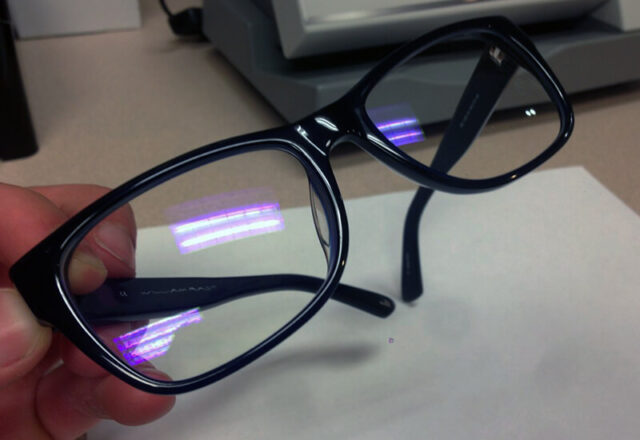
Nowadays, we spend most of our time looking up at screens on our mobile phones, laptops for work, or television, while binging our favorite web series. But unfortunately, while staring at screens continuously for long hours, we usually don’t keep track of how much blue light our eyes are exposed to.
During the pandemic situations, significant sectors of the world shifted online, including online education and working from home. The students and the professionals are the ones who had to get adjusted to this change real fast.
What Is Blue Light?
The blue light that we mentioned before is a light ray with energy. It lies at the end of the visible spectrum, just next to Ultraviolet rays. Each color of this visible spectrum has different wavelengths and energy levels. So, for example, blue light has shorter wavelengths and higher frequency because it has high energy, and it can cause potential damage to our eyes.
It has been found that large amounts of Ultraviolet rays and blue light from the sun are harmful to our eyes and can cause damage. Similarly, it is considered that the blue light from screens impacts our eyes, too, although more research is needed.
How Does Blue Light Affect Us?
About 50% of the students and professionals who use computers for a long time face issues like dry, irritated eyes and blurred vision. Apart from that, blue light has its negative impacts too.
Blue light can cause damage to our retinas. This is known as phytotoxicity. The cornea and lens in our eyes block the most harmful radiation, but they cannot stop the blue light from reaching the retina. The intensity of the damage depends on the duration to which the eyes have been exposed.
It is also said that blue light can increase the risks of macular degeneration, which would affect your vision and can even make you blind. Other than that, blue increases the chances of getting cataracts.
Another impact blue light has on us that affects our daily lives is our circadian rhythm. Usually, people now spend time on their mobile screens before going off to bed. The blue light emitted from the screens alerts our brain. Our circadian cycle or sleep cycle is regulated by melatonin, and blue light causes an imbalance in melatonin secretion, which in turn affects the daily sleep schedule.
Lastly, blue light also increases the frequency of headaches and migraine attacks.
What are blue light glasses, and how do they work?

Blue light glasses limit the exposure of the blue light that is emitted from the screens. Apart from that, they also provide non-glare protection. Therefore, they can reduce the blue light exposure, but they can also reduce the computer vision syndrome symptoms that most professionals and students face now.
Blue light glasses thereby release the strain on the eye from staring at screens for the entire day. Also, they prevent any disturbance in the sleep cycle and reduce the risks of migraine attacks.
Benefits of having Blue Light Glasses
Blue light glasses have become an emerging necessity with the increasing exposure to mobile and laptop screens. Whether you’re a working professional or a student, you need to spend a chunk of time behind screens. So having protection against the harmful rays is something blue light glasses can help you fix.
Let’s jump on to various advantages these glasses have on your eyes!
Reduces eye stress & diseases
Spending a lot of time in front of devices might result in persistent stress in the eyes or, in severe cases, lead to eye diseases. Using blue light glasses can help you maintain the release of cortisol hormone, also known as the stress hormone. The controlled release of cortisol regulates your body function by keeping blood pressure and blood sugar under control. Blue light glasses keep your cortisol levels in range as long exposure can result in fluctuations.
Reduces discomfort in eyes
Using digital devices for a long time can result in digital eye strain or computer vision syndrome. Their blur light filtering mechanism helps minimize eye strain and boost your focus. In addition, it results in greater productivity by incurring less stress on your eyes.
Prevent macular degeneration
Age-related macular degeneration (AMD) is an eye condition that can arise due to continuous exposure to harmful blue light for a prolonged span. Blue light glasses help cut down the effect of hazardous blue light that penetrates your eyes through the retina. Using blue light glasses, you can mitigate the severe eye condition and fight the conditions like tired eyes or headaches.
Stimulate better sleep

Research shows that prolonged exposure to blue light affects the sleep cycle. Our body is accustomed to getting exposed to blue light in a specific amount. More than that results in exhaustion, headaches, puffy eyes, etc. Using blue light glasses is assistive in stimulating better sleep by reducing the amount of blue light exposure.
Fewer headache issues
Blue light is assistive in triggering headaches and migraine to an extreme extent. If you’re using blue light glasses, you can reduce the possibility of a migraine attack and curtail the frequent headaches as these glasses block the blue light from entering your eyes.
Conclusion!
With the increase in the work requirements and demand for long sitting hours in front of screens, there is a boost in protective technologies. One such technology is blue light glasses which help alleviate the dangerous effects of blue light. You can witness the impact of these glasses by experiencing muscle and eye relaxation in a few days.
You require to get quality blue light glasses to prevent your eyes from extreme damage. If you’re a student or a professional, you should opt for blue light glasses from SmartBuyGlasses UK to improve your visual health. We have a wide range of blue light glasses available, and you can choose according to your needs and preferences.












